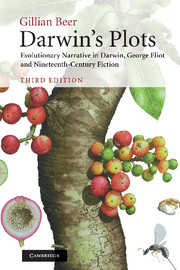Book contents
- Frontmatter
- Contents
- Foreword by George Levine
- Preface to the first edition
- Preface to the second edition
- Preface to the third edition
- Introduction
- Part I Darwin's language
- Part II Darwin's plots
- Part III Responses: George Eliot and Thomas Hardy
- Notes
- Select bibliography of primary works
- Further reading related to Charles Darwin
- Index
Preface to the second edition
Published online by Cambridge University Press: 04 August 2010
- Frontmatter
- Contents
- Foreword by George Levine
- Preface to the first edition
- Preface to the second edition
- Preface to the third edition
- Introduction
- Part I Darwin's language
- Part II Darwin's plots
- Part III Responses: George Eliot and Thomas Hardy
- Notes
- Select bibliography of primary works
- Further reading related to Charles Darwin
- Index
Summary
Darwin has grown younger in recent years. He is no longer the authoritative old man with a beard substituting for God. Instead his work and life are again in contention and debate. Sociologists, microbiologists, linguists, sociobiologists, philosophers, feminists, psychologists, biographers, geneticists, novelists, poets, post-colonialists, have their say. Moreover, the publication, volume by tremendous volume since 1985, of the Darwin Correspondence has shown us that, so far as Darwin's theories go, everything started with a young man, eager for knowledge and adventure, who set out on a journey round the world just before his twenty-third birthday: the age of a postgraduate student now. The letters bring out the vivid engagement of the young Darwin on his Beagle travels, the ardour of his response to the natural world and the immediacy of his engagement with societies he encountered. His vacillations in language register how hard he found it to settle his opinions of other tribes. His struggles with categories break open settled taxonomies. The stamina of his mental exploration gives the lie to the outworn assumption that once back from the Beagle he merely settled into a comfortable humdrum life. He was still on his world journeys while he sat in his armchair, his mind packed with the materiality of the physical world and sharpened by exceptions noted. His greenhousee could harbour questions that unsettled the assumptions of the western world – and he determined to engage with those questions.
- Type
- Chapter
- Information
- Darwin's PlotsEvolutionary Narrative in Darwin, George Eliot and Nineteenth-Century Fiction, pp. xvii - xxxiiPublisher: Cambridge University PressPrint publication year: 2009



